The Zinoviev letter was a fake document published and sensationalised by the British Daily Mail newspaper four days before the 1924 United Kingdom general election, which was held on 29 October. The letter purported to be a directive from Grigory Zinoviev, the head of the Communist International (Comintern) in Moscow, to the Communist Party of Great Britain (CPGB), ordering it to engage in seditious activities. It stated that the normalisation of British–Soviet relations under a Labour Party government would radicalise the British working class and put the CPGB in a favourable position to pursue a Bolshevik-style revolution. It further suggested that these effects would extend throughout the British Empire. The right-wing press depicted the letter as a grave foreign subversion of British politics and blamed the incumbent Labour government under Ramsay MacDonald for promoting the policy of political reconciliation and open trade with the Soviet Union on which the scheme appeared to depend. The election resulted in the fall of the first Labour government and a strong victory for the Conservative Party and the continued collapse of the Liberal Party. Labour supporters often blamed the letter, at least in part, for their party's defeat.

The Morning Star is a left-wing British daily newspaper with a focus on social, political and trade union issues. Originally founded in 1930 as the Daily Worker by the Communist Party of Great Britain (CPGB), ownership was transferred from the CPGB to an independent readers' co-operative, the People's Press Printing Society, in 1945 and later renamed the Morning Star in 1966. The paper describes its editorial stance as in line with Britain's Road to Socialism, the programme of the Communist Party of Britain.

William Gallacher was a Scottish trade unionist, activist and communist. He was one of the leading figures of the Shop Stewards' Movement in wartime Glasgow and a founding member of the Communist Party of Great Britain. He served two terms in the House of Commons as the last Communist Member of Parliament (MP).
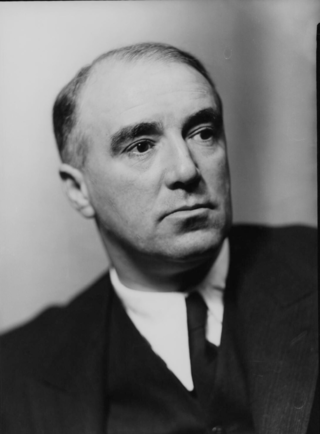
Harry Pollitt was a British communist who served as the General Secretary of the Communist Party of Great Britain (CPGB) from July 1929 to September 1939 and again from 1941 until his death in 1960. Pollitt spent most of his life advocating communism. Ideologically a Marxist–Leninist, Pollitt was an adherent particularly of Joseph Stalin even after Stalin's death and disavowal by Nikita Khrushchev. Pollitt's acts included opposition to the Allied intervention in the Russian Civil War and Polish–Soviet War, support for the Spanish Republicans during the Spanish Civil War, both support and opposition to the war against Nazi Germany, defence of the communist coup in Czechoslovakia, and support for the 1956 Soviet invasion of Hungary.
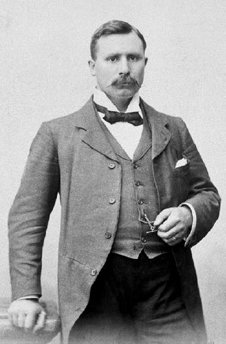
Thomas Mann, was an English trade unionist and is widely recognised as a leading, pioneering figure for the early labour movement in Britain. Largely self-educated, Mann became a successful organiser and a popular public speaker in the British labour movement.
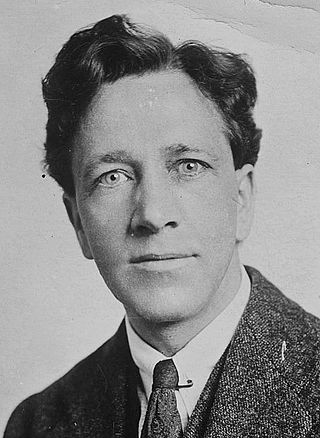
Arthur MacManus was a Scottish trade unionist and communist politician.
The National Minority Movement was a British organisation, established in 1924 by the Communist Party of Great Britain, which attempted to organise a radical presence within the existing trade unions. The organization was headed by longtime unionist Tom Mann and future General Secretary of the CPGB Harry Pollitt.
John Thomas Murphy was a British trade union organiser and Communist functionary. Murphy is best remembered as a leader of the communist labour movement in the United Kingdom from the middle 1920s until his resignation from the Communist Party of Great Britain in 1932.

Walter "Wal" Hannington (1896–1966) was a founding member of the Communist Party of Great Britain and National Organiser of the National Unemployed Workers' Movement, from its formation in 1921 to its end in 1939, when he became National Organiser of the Amalgamated Engineering Union.

Albert Samuel Inkpin, was a British communist and the first General Secretary of the Communist Party of Great Britain (CPGB). He served several terms in prison for political offences. In 1929 he was replaced as head of the CPGB and made head of the party's Friends of Soviet Russia organisation, a position he retained until his death.
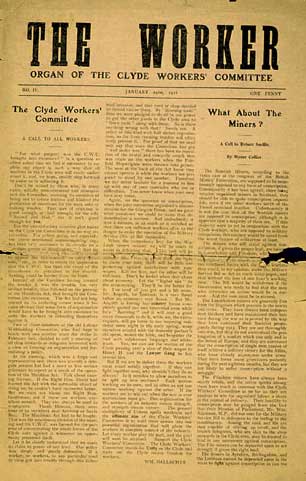
The Clyde Workers Committee was formed to campaign against the Munitions Act. It was originally called the Labour Withholding Committee. The leader of the CWC was Willie Gallacher, who was jailed under the Defence of the Realm Act 1914 together with John Muir for an article in the CWC journal The Worker criticising the First World War.

John Ross Campbell was a British communist activist and newspaper editor. Campbell was a co-founder of the Communist Party of Great Britain and briefly served as its second leader from July 1928 to July 1929. He is best remembered as the principal in the Campbell Case. In 1924, Campbell was charged under the Incitement to Mutiny Act for an article published in the paper Workers' Weekly. Campbell called on British soldiers to "let it be known that, neither in the class war nor in a military war, will you turn your guns on your fellow workers, but instead will line up with your fellow workers in an attack upon the exploiters and capitalists." He was sentenced to six months in prison.
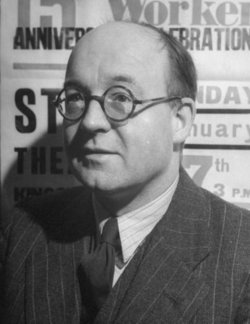
William Charles Rust was a British newspaper editor and communist activist.
The Hands Off Russia campaign was an international political initiative first launched by British Socialists in 1919 to organise opposition to the British intervention on the side of the White armies against the Bolsheviks in the Russian Civil War, as well as to oppose support for Poland during the Polish-Soviet war. The movement was funded partly with financial support from the Bolsheviks themselves. Their most prominent success was in stopping the sailing of the SS Jolly George with munitions bound for Poland. The movement was encouraged by the fledgling Communist International and ultimately emulated in several other countries, including the United States, Canada, and Australia.

The British Socialist Party (BSP) was a Marxist political organisation established in Great Britain in 1911. Following a protracted period of factional struggle, in 1916 the party's anti-war forces gained decisive control of the party and saw the defection of its pro-war right wing. After the victory of the Bolshevik Revolution in Russia at the end of 1917 and the termination of the First World War the following year, the BSP emerged as an explicitly revolutionary socialist organisation. It negotiated with other radical groups in an effort to establish a unified communist organisation, an effort which culminated in August 1920 with the establishment of the Communist Party of Great Britain. The youth organisation the Young Socialist League was affiliated with the party.

The Communist Party of Great Britain (CPGB) was the largest communist organisation in Britain and was founded in 1920 through a merger of several smaller Marxist groups. Many miners joined the CPGB in the 1926 general strike. In 1930, the CPGB founded the Daily Worker. In 1936, members of the party were present at the Battle of Cable Street, helping organise resistance against the British Union of Fascists. In the Spanish Civil War the CPGB worked with the USSR to create the British Battalion of the International Brigades, which party activist Bill Alexander commanded.
Frederick Harold Peet was a British communist activist.
George Peet was a British communist activist and trade unionist.
The Shop Stewards Movement was a movement which brought together shop stewards from across the United Kingdom during the First World War. It originated with the Clyde Workers Committee, the first shop stewards committee in Britain, which organised against the imprisonment of three of their members in 1915. Most of them were members of the Amalgamated Society of Engineers (ASE). In November 1916 the Sheffield Workers Committee was formed when members of the ASE there went on strike against the conscription of a local engineer. The government brought the strike to an end by exempting craft union members such as ASE engineers from military service. However when this policy was reversed in May 1917, this met by a strike involving 200,000 workers in 48 towns. The Shop Stewards Movement arose from organising this strike.
William Henry Thompson (1885–1947) was an English radical lawyer closely involved with trade unions, who founded Thompsons Solicitors. From the 1920s he was associated with the Communist Party of Great Britain (CPGB). He was married to Joan Beauchamp, a prominent suffragette.













